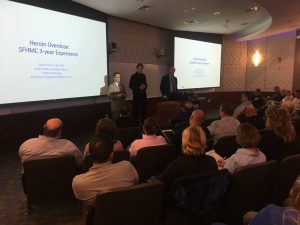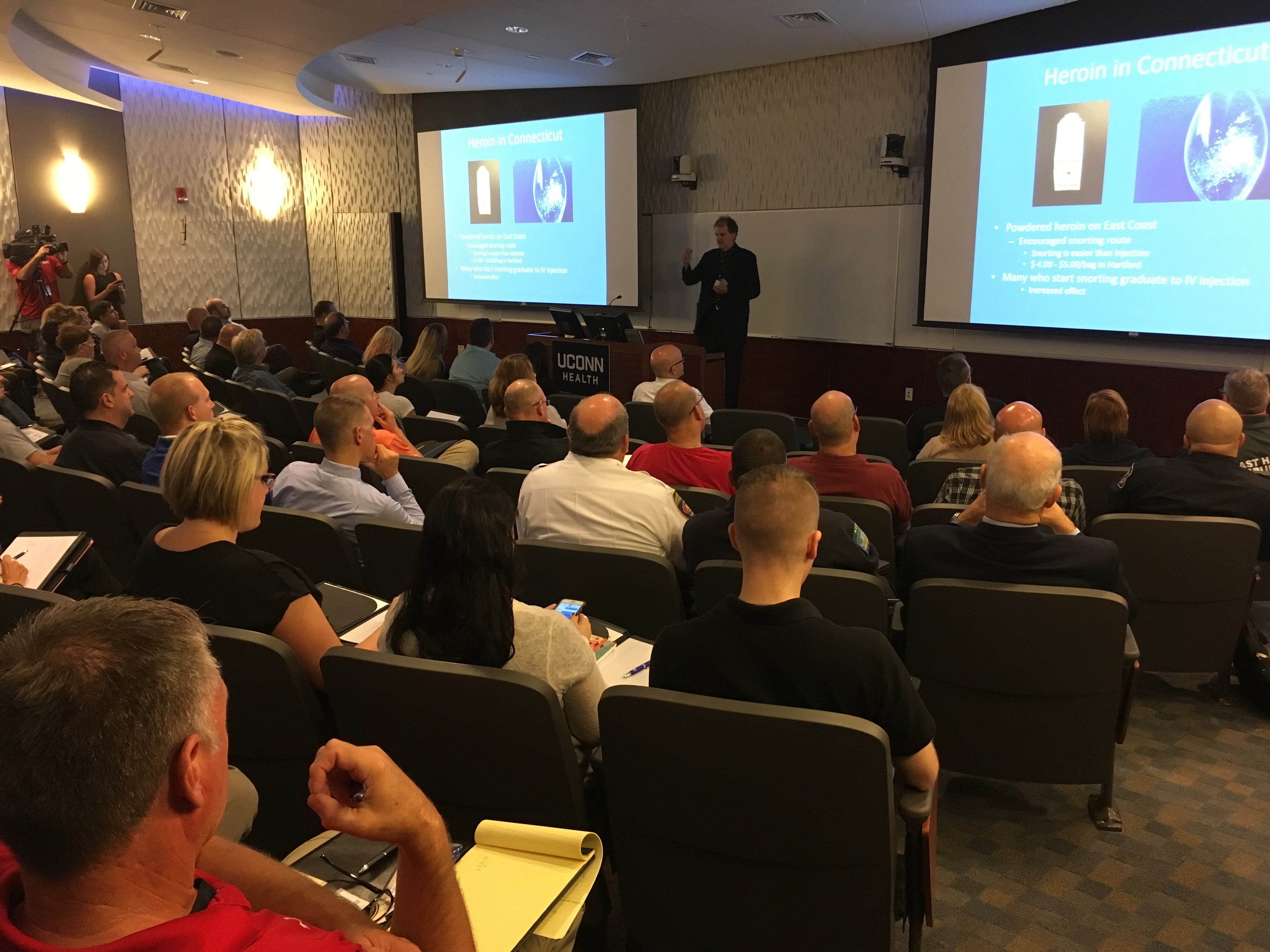More than 100 experts gathered at UConn Health on Sept. 20 for a statewide forum examining the opioid overdose epidemic and ways to combat the crisis.
The event, co-hosted by UConn Health and Connecticut’s Department of Public Health’s Office of Emergency Medical Services, discussed how to curb the growing epidemic and its complexities, the rise in use of the dangerous synthetic opioid called fentanyl, and the drastic increase in overdose deaths in Connecticut.
“The opioid overdose crisis is a huge issue here in Connecticut and nationwide,” says Peter Canning, R.N., paramedic and the EMS coordinator for UConn John Dempsey Hospital who helped organize the event with Dr. Richard Kamin, the EMS Program Director of UConn Health.
“To gain traction on this opioid problem it’s going to take our entire community,” stressed Kamin. “I want to thank everyone for being here today.”
 In 2015 there were 729 overdose deaths in Connecticut. In 2016 it increased by 25 percent to 917 overdose deaths, and this year overdose deaths are expected to climb by 17.5 percent to a projected 1,078.
In 2015 there were 729 overdose deaths in Connecticut. In 2016 it increased by 25 percent to 917 overdose deaths, and this year overdose deaths are expected to climb by 17.5 percent to a projected 1,078.
“We want to do anything we can to prevent death or fatal overdose,” shared Mark Jenkins, executive director of the Greater Hartford Harm Reduction Coalition, Inc. “There is a lot for us to do.”
At the forum Sarah C. Howroyd of Manchester shared her personal struggle with opioid addiction after being prescribed OxyContin for pain relief following her 2005 car accident.
“It just snowballed,” said Howroyd about her opioid drug addiction. “If this can happen to me, it can happen to anyone.” After conquering her addiction, Howroyd now advocates for prevention and education for the opioid crisis as co-founder of the CT Hope Initiative.
The statewide forum is just one way UConn Health and DPH together are taking a leadership role in helping fight the state’s opioid epidemic. In addition, they introduced a newly created training tool to help first responders greater assist in saving more lives. The new free online training program can help further prepare EMS in the field to intervene in opioid overdose emergencies they may now be encountering more frequently and in a manner that will reduce patient death.
Also, a new EMS Initiative called “Early Warning Systems” will soon be piloted in Hartford to test the feasibility of the Connecticut Poison Control Center sending out an alert to the community if on any given day EMS encounter an uptick in drug overdose cases.
“Addiction is one of the most hard-wired brain diseases that there is,” explained Dr. Surita Rao, associate professor of psychiatry at UConn Health. She shared how stopping opioid use, whether prescribed or illegal heroin, and coping with their withdrawal symptoms are very challenging for patients without necessary medical intervention and counseling.
Other forum speakers included: Charles McKay, M.D., acting director, Connecticut Poison Control Center; Marisa Edelberg, Medicolegal Death Investigator, State of CT Office of the Chief Medical Examiner; Raffaella “Ralf” Coler R.N., MEd., paramedic & director, Office of Emergency Medical Services; C. Steven Wolf, M.D., chairman, Emergency Medicine, Saint Francis Medical Center; and Kelsey Opozda and Robert Lawlor of New England High Intensity Drug Trafficking Area (HIDTA) Program, Connecticut Intelligence Center (CTIC).
If you or a loved one are struggling with substance abuse addiction, call the 24/7 hotline: 1-800-563-4086.
If an overdose is ever suspected, immediately call 9-1-1.
Narcan (naloxone), used to treat overdose, is readily available at CT pharmacies should you or your loved one be high-risk for a future overdose. Also, these interested patients should consult their primary care physicians about naloxone.



